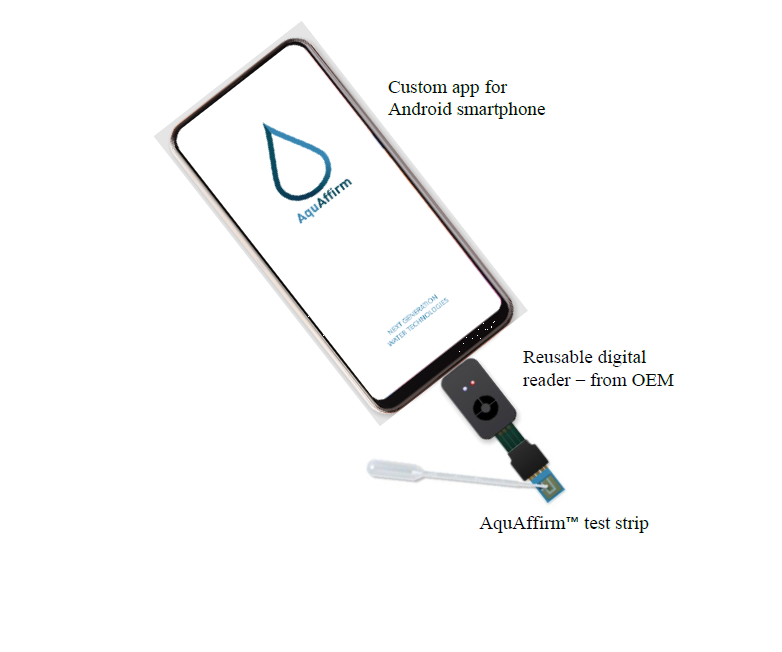AquAffirm unveils groundbreaking sensor for detecting PFAS “forever chemicals”
AquAffirm announces it has demonstrated first proof-of-concept for the rapid digital detection of a PFAS “forever chemical” in water using the proprietary AquAffirm™ platform
Portable smartphone-enabled system with cloud-connectivity will transform PFAS management across the globe
LONDON, UK – AquAffirm Ltd is pleased to announce that it has demonstrated the first proof-of-concept for use of its proprietary AquAffirm™ water contaminant measurement system to detect a PFAS1 “forever chemical”. The AquAffirm team demonstrated the ability of its smartphone-enabled system, which gives a digital readout and has cloud-connectivity, to detect ultra-low levels of the chemical PFOA2, one of the primary “forever chemicals” which are emerging as a global environmental concern.
Development of such an easy-to-use portable, digital detector marks a significant advancement in the battle against PFAS “forever chemicals.” These persistent contaminants, widely used in industrial applications and consumer products, pose serious environmental and health risks due to their prevalence, resistance to degradation and impact on health. A recent US Geological Survey study reported on the CNN website found that almost 50% of US tap water is contaminated with PFAS.3 The AquAffirm™ sensor’s ability to accurately detect PFAS at low concentrations represents a breakthrough in environmental monitoring and public health protection, offering a powerful tool to identify and address contamination.
The implications of this technology are profound. Current methods for detecting PFAS are often costly, time-consuming, and require specialized laboratory equipment, limiting their accessibility and widespread use. AquAffirm’s sensor, on the other hand, represents a more efficient and cost-effective alternative, enabling real-time, on-site testing. This can drastically improve response times to contamination events, allowing for quicker mitigation measures and reducing the long-term impact of these hazardous substances on ecosystems and human health.
Moreover, the adoption of AquAffirm’s sensor technology could lead to stricter regulatory standards and enhanced enforcement of environmental protections. By providing reliable and easy-to-use detection methods, policymakers and industry stakeholders will be better equipped to monitor and manage PFAS contamination. This innovation not only strengthens efforts to safeguard the environment but also paves the way for cleaner manufacturing processes and the development of safer alternatives to PFAS, fostering a healthier and more sustainable future.
The AquAffirm™ platform, which uses an innovative smartphone-enabled design that includes disposable test strips, mobile app and web-connected software platform developed by the AquAffirm team, has also recently been demonstrated for detecting low levels of two key antibiotics in water.
“We’re thrilled to have achieved this important milestone in the development of the AquAffirm™ technology,” commented Dr David Sarphie, AquAffirm CEO. “PFAS chemicals are becoming a concern worldwide and portable digital tools, like the AquAffirm™ platform, that enable rapid detection, measurement and mapping will have a significant impact that will drastically improve management of the issue globally.”
1 PFAS: Per- and polyfluoroalkyl substances
2 PFOA: Perfluorooctanoic acid
3 Reported on CNN website: https://edition.cnn.com/2023/07/05/health/pfas-nearly-half-us-tap-water-wellness/index.html
—————————————————————————————————————————————————————————————-
About PFAS
Per- and polyfluoroalkyl substances (PFAS) are a large class of thousands of synthetic chemicals that are used throughout society in industrial sectors such as aerospace and defence, automotive, aviation, food contact materials, textiles, leather and apparel, construction and household products, electronics, firefighting, food processing, and medical articles. However, they are increasingly detected as environmental pollutants, and some are linked to negative effects on human health, potentially leading to health problems such as liver damage, thyroid disease, obesity, fertility issues and cancer.
About PFAS Regulatory Status in UK and USA
While the U.S. Environmental Protection Agency (EPA) has established a threshold of 4 parts per trillion (ppt) as of April 2023, the regulatory landscape in the UK presents a different scenario:
The UK Environment Agency has been actively monitoring PFAS levels in water and is working towards developing more comprehensive regulations. However, enforceable limits for all PFAS compounds in drinking water or environmental waters have yet to be fully established nationwide. Key points regarding the UK’s regulatory status at this time include:
- The Drinking Water Inspectorate (DWI) has set a precautionary guidance value of 100 ng/L (ppt) for the sum of PFOS and PFOA in drinking water.
- There are considerations to adopt stricter standards similar to those proposed by the EU, which aim to limit the sum of 20 PFAS compounds to 100 ng/L in drinking water.
- Environmental Quality Standards (EQS) exist for PFOS in surface waters, but not for all PFAS compounds.
- There is growing pressure from environmental groups and certain policymakers to enforce more comprehensive regulations on PFAS in both drinking water and environmental waters.
- The UK government is committed to further research and monitoring of PFAS in the environment to guide future regulatory decisions.
About Bio Nano Consulting
Bio Nano Consulting (BNC) is a best-in-class technology and strategic consultancy focusing at the interface between bio-, nano- and digital technologies, providing project management, product development and strategic consultancy to a range of international clients from industry, academia and government. BNC is a wholly owned subsidiary of AquAffirm Ltd.
About AquAffirm
AquAffirm develops proprietary digital tools/services to help clients from industry and the water sector reduce their environmental impact and improve sustainability. Specifically, AquAffirm is commercialising innovative digital smartphone-enabled point-of-use sensors and software platforms to help clients manage critical water infrastructure networks, control unwanted environmental contaminant release, and monitor/map environmental impact. As a service, AquAffirm also develops bespoke digital sensors specifically for its clients’ needs. AquAffirm’s long-term vision is to build a mobile-enabled network of sensors & software for water sustainability to include the most advanced digital water contaminant measurement platform for rapid measurement, monitoring and mapping of contaminants at the point-of-use.
—————————————————————————————————————————————————-
AquAffirm™ sensor platform:

Contact AquAffirm at: nanda.rahman@aquaffirm.com
+44 (0) 20 3095 7252
-END-





